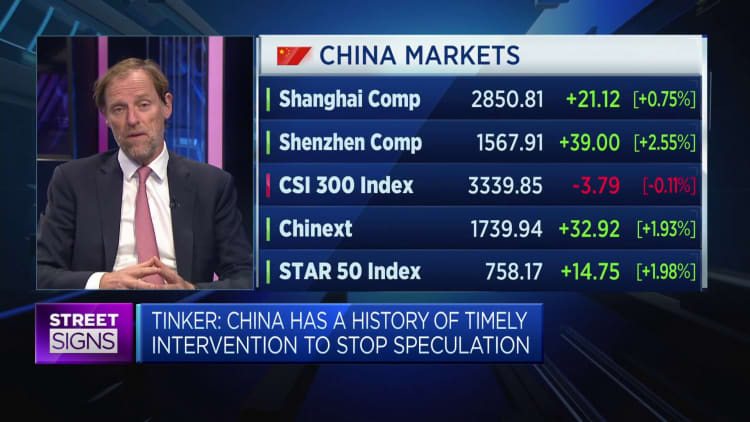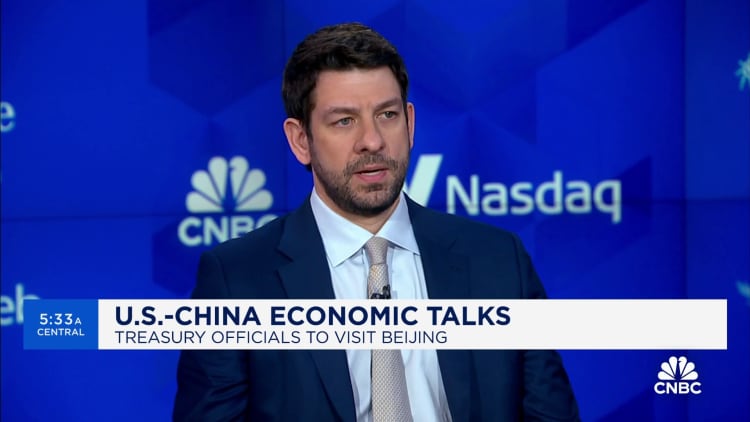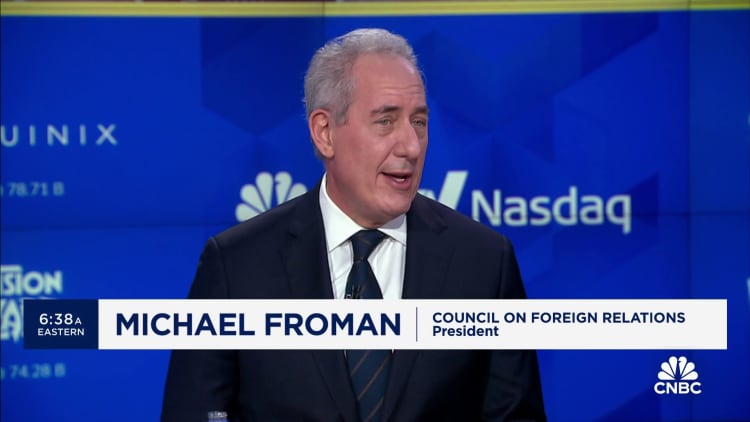Many Chinese language builders have halted or delayed development on presold properties as a consequence of money movement issues. Pictured here’s a property development web site in Jiangsu province, China, on Oct. 17, 2022.
Future Publishing | Future Publishing | Getty Photos
China’s economic system is sputtering.
Its property market is crumbling, deflationary pressures are spreading throughout the nation, and its inventory market has weathered a turbulent journey to this point this 12 months, with the nation’s CSI 300 index erasing some 40% of its worth from its 2021 peaks.
Including salt to the wound, January PMI numbers launched by China’s Nationwide Bureau of Statistics confirmed manufacturing exercise contracted for the fourth month in a row, pushed by slumping demand.
The slew of downbeat information has consequently triggered a wave of skepticism towards the world’s second-largest economic system. Allianz for one, reversed its buoyant view of China, now forecasting Beijing’s economic system to develop by a mean 3.9% between 2025 to 2029. That is down from a 5% forecast earlier than the Covid-19 pandemic broke out.
Ex-Worldwide Financial Fund official Eswar Prasad additionally informed Nikkei Asia that “the likelihood of the prediction that China’s GDP will one day overtake that of the U.S. is declining.”
In the meantime, high economist and Allianz advisor Mohamed El-Erian highlighted China’s dismal inventory market efficiency towards these within the U.S. and Europe in a chart on X, saying it exhibits the stark divergence between all three fairness markets.

China itself, nonetheless, is not keen to admit its economic system is in tatters. Chinese language chief Xi Jinping mentioned on New 12 months’s Eve that the nation’s economic system had grown “more resilient and dynamic this year.”
Feeding on such optimism, it is truthful to say there’s been some indicators of hope for the beleaguered economic system, however maybe not sufficient to sway the bears. As an example, manufacturing facility exercise in China expanded for a third-straight month in January, whereas the nation’s luxurious sector seems to be snapping again.
Such information has prompted bullish chatter amongst traders, suggesting consensus on China clearly lacks uniform.
Period of stagnation
Nobel laureate Paul Krugman has been amongst among the most bearish voices towards China, saying the nation is coming into an period of stagnation and disappointment.
China was imagined to increase after it lifted its stringent “zero-Covid” measures, Krugman wrote in a latest New York Occasions op-ed. Nevertheless it did the precise reverse.

From unhealthy management to excessive youth unemployment, the nation is dealing with headwinds from all corners, Krugman argued. And the nation’s financial stumble is not remoted, Krugman warns, probably turning into everybody’s downside.
Property disaster
China’s well-known property troubles have been the crux of Wall Avenue bearishness towards the Asian nation.
The Worldwide Financial Fund mentioned it expects housing demand to drop by 50% in China over the subsequent decade.
Talking on the World Financial Discussion board in Davos final month, IMF chief Kristalina Georgieva mentioned China’s actual property sector wants “fixing,” whereas Beijing wants structural reforms to keep away from a decline in progress charges.
In the meantime, famed hedge fund supervisor and founding father of Dallas-based Hayman Capital Kyle Bass mentioned the nation’s closely indebted property market has triggered a wave of defaults amongst public builders. That is an issue, given China’s actual property market can account for as a lot as a fifth of the nation’s GDP.
“This is just like the U.S. financial crisis on steroids,” Bass mentioned, referring to China’s default-ridden property market.
“China is going to get much worse, no matter how much their regulators say, ‘we’re going to protect individuals from malicious short-selling,'” he added.
“The basic architecture of the Chinese economy is broken,” Bass continued.
Glimmers of hope
A depressing image for China, nonetheless, is not shared by all.
The Institute of Worldwide Finance mentioned Beijing has the coverage capability to push China’s economic system towards its progress potential and caught to its above consensus forecast for 2024 progress at 5%, in a latest weblog put up. That view, nonetheless, is determined by enough demand-side stimulus. The most recent GDP numbers out of China for the final three months of 2023 missed analysts’ estimates, with a determine of 5.2%.

On the identical time, Clocktower Group associate and chief strategist Marko Papic took an optimistic short-term view towards Chinese language equities. In a Feb. 7 CNBC interview, Papic mentioned he forecasts China shares to leap at the very least 10% within the coming days as officers sign help efforts to bolster its flailing inventory market.
A “10% to 15% rally in Chinese equities is likely in coming trading days,” Papic mentioned.
JPMorgan Personal Financial institution additionally outlined bull case eventualities for China in a latest put up. “Despite the stock market’s slipping sentiment and persistent problems with the property market, certain segments of the Chinese economy have also proved their resilience,” it mentioned.
The financial institution mentioned China’s essential position as a worldwide producer is unlikely to abate, including that cyclical demand for its exports might stay intact.
Wanting forward, China has hurdles to beat. Whether or not it has the firepower to take action, nonetheless, stays to be seen.

